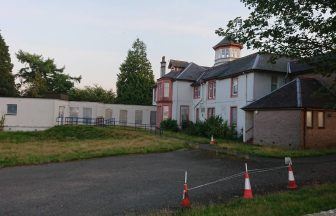The number of youngsters under the age of 18 jailed at Scotland’s main young offenders institution has fallen to a record low.
There are now 150 people imprisoned at Polmont, near Falkirk, and only 12 of them are under the age of 18, according to figures from the Scottish Prison Service.
A decade ago, there was 800 youngsters at Polmont.
Alternatives to custody such as electronic monitoring means a significant number of offenders under the age of 21 are now accommodated within society.
As part of its commitment to improving the lives of care experienced young people through The Promise, the Scottish Government wants to remove anyone under the age of 18 from the prison estate by 2024.
Instead, those in the system will be given “care-based alternatives” to rehabilitation.
Polmont is Scotland’s national holding facility for male young offenders aged between 16 and 21. Sentences range from six months to life, with the average sentence length between two and four years.
Governor Gerry Michie said Scotland has made “significant leaps” to reduce the prisoner population and help give young people in the system opportunities for a better future.
He said: “This prison is far more quiet. Everybody is in a single cell [and] experiences a therapeutic, engaging and purposeful [rehabilitation].
“If we have any issues with any people not engaging, then we will actively engage with them through community safety or the inclusion of a personal officer.
“Many of these prisoners come from traumatic, complex backgrounds, which can result in physical and mental health needs. I genuinely believe by offering these people a voice and an opportunity to shine, we can make a difference.”
Polmont offers a wide range of courses and services for learning and development – from life skills such as cooking, cleaning and laundry to manual labour and employability qualifications.
Mr Michie added: “We are a vocational training establishment. Our whole ethos whenever someone comes in is about preparing them to return to society. There’s a huge employability agenda for the men in our care.
“We try to look at what kind of industries are available to them on the outside. You can learn plumbing, bricklaying and joinery here, hospitality and you can qualify for your CSCS card.
“We try to give those in our care an opportunity that will better set them up for their time outwith prison, returning back to their own families and communities.”
Scotland has a higher prison population than other countries in the UK and most of Western Europe, with the cost of accommodating a prisoner approximately £38,000 per year.
Justice secretary Keith Brown said reducing prison numbers would help improve the wellbeing of both prisoners and staff and also help curb reoffending.
Brown said the government could instead invest more in care facilities and the use of electronic tagging to meet the 2024 goal.
He said: “We know it doesn’t work in most cases. We know it’s the wrong thing to do. We have to continue our efforts to reduce the prison population in a safe way.
“I’m quite surprised that we have this divide where some newspapers and opposition politicians will say it’s soft justice. How is it soft justice when we are reducing crimes and the number of victims? Surely that’s what we all want to do.
“We have to have prisons to protect society. We have to have people that can’t be allowed to do things they have done that caused them to be in prison. That’s got to be the bottom line. It has to be consistent with safety.
“Some people are punished. That’s part of the purpose of them coming to prison in the first place.
“But more than that, [we] expect prison staff in a civilised society to do what they can with [the] people they have, to make sure there is less and less chance of them reoffending.”
Follow STV News on WhatsApp
Scan the QR code on your mobile device for all the latest news from around the country


 STV News
STV News
























